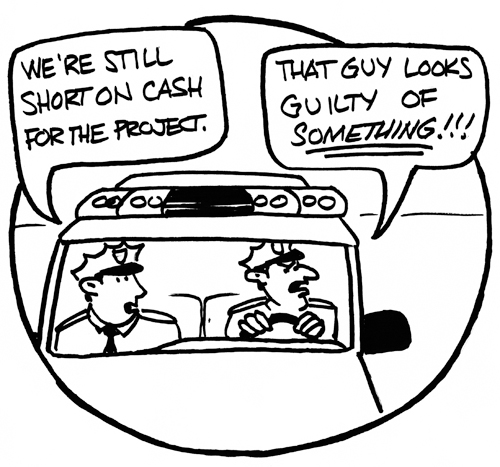Policing for Profit (Part 1)
Recently, the Post and Courier published an article titled “Charleston lawmaker says let criminals pay for police body cameras.” The article discusses the move by local legislators that have pre-filed legislation to provide body cameras for our law enforcement officers and how they can be paid for without costing the taxpayer a dime. Police body cameras or the lack thereof is a hot button issue nationwide. This article is not going to debate whether body cameras will solve these problems but rather, the proposed source of funding for these cameras. I admit when you read the headline and listen to the reasoning it sounds like a win-win for all concerned, both police and taxpayers. Lets face it, taking the ill-gotten gains from criminal enterprises and using those profits to equip law enforcement sounds great, even “Brilliant” as the article stated. But is it? Is that really what is going on here?
Exactly how will the cameras be funded and are the funds really coming from criminals? I believe to make the argument that the funds are going to come from criminals, and communicate that to the public, you at least must have to make an arrest, otherwise you can’t claim the money came from criminals right. Because what the legislators aren’t telling you, and they know, is that the majority of the funding is going to come from civil forfeiture cases where an arrest is never made, forget about securing a criminal conviction. To understand this, we can look to other states that have implemented such strategies and see how law enforcement agencies have used civil forfeiture.
What is civil-asset forfeiture?
Civil-asset forfeiture is a mechanism by which the federal or state government can seize your property without even placing you under arrest. That’s right, it’s not whether you have been convicted of a crime. It’s worse. You do not even have to be arrested for the government to seize your cash, vehicle, or home. The below clips from John Oliver’s show uses comedy to show the ridiculous nature of the program and how it is enforced.
Here’s the central problem with this procedure and how it is enforced by police. You don’t need to be charged with a crime. In fact, in many cases the police do not charge you with a crime because they would not be able to show your cash was part of a criminal enterprise as the quantity of drugs were simply to small.
Let criminals pay – Is that what we are doing?
The Post and Courier article quoted one lawmaker claiming that “It’s a win-win for law enforcement officers and citizens.” But is it really? On its face, it’s hard to argue against this premise, at least reasonably, that taking the ill gotten gains from criminal enterprises to pay for body cameras does benefit society as a whole. After all, body cameras could help resolve many of the conflicts that exist between police-citizen encounters. Even better, none of this funding is coming from the public via taxes or diverted funds from other needed government projects that will now have to be put on the back burner.
However, if we are going to be honest about what is being proposed when it comes to civil asset forfeiture, then we need to be aware of the abuse that occurs when you grant law enforcement with such authority.
Why you should care?
When we place law enforcement in the position of revenue raising for their equipment, we give them a financial incentive that directly conflicts with their stated purpose, namely “To protect and serve.” We now shift their primary goal of law enforcement to that of fundraiser to satisfy their own budget. If you want cameras, equipment, or anything (kegs, margaritas machines, whiskey) go out and get it through civil asset forfeiture. We shouldn’t act surprised when we see the examples below from Texas (Kegs for Police) or Missouri (Penny’s from Heaven). And that’s the real problem with civil asset forfeiture, it’s a rubber stamp with virtually no oversight.
How much money you got – Huh?
Civil Asset Forfeiture Attorney, Charleston SC
If you have had your property taken through civil asset forfeiture contact an experienced and trusted criminal defense lawyer Charleston, SC call the Dale Savage Law Firm today for a free case evaluation (843) 530-7813.

